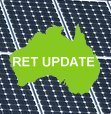According to credible sources, large wind farm developers descended on Canberra last week to lobby members of the Senate to further amend upcoming changes to the Renewable Energy Target – amendments that may negatively impact on Australia’s home solar power industry.
The Renewable Energy Target requires electricity retailers to purchase and surrender a certain number of renewable energy certificates (RECs) each year. The volume of certificates surrendered is ramping up to be at least the equivalent of 20% of Australia’s energy by 2020.
Each renewable energy certificate is the equivalent of 1 megawatt of renewable energy production. These certificates form the basis of many rebates that make solar power affordable for households.
On 25 February 2010, the Government announced that it intends to split the Renewable Energy Target (RET) and associated renewable energy certificates into two systems – the SRET and the LRET. Certificates from small renewable energy systems such as home solar power and solar hot water systems would fall under the SRET and certificates from large renewable energy systems such as wind farms will be under the LRET from 1 January 2011, assuming the legislation is passed.
The splitting of the RET is intended to help stabilise the falling values of renewable energy certificates and would provide a minimum value under the SRET of $40 per certificate.
The proposed change to the legislation, which occurred after extensive consultation with renewable energy companies including national solar solutions provider Energy Matters, was also designed to allow contracts for the future supply of renewable energy certificates that pre-date 25 February 2010 to be settled with the higher value certificates created under the new SRET system.
While such contracts are not overly common, sources say large wind farm developers want to prevent the arrangement from happening altogether to create a shortage of large scale renewable energy certificates sooner. This would significantly increase the price of large scale renewable energy certificates, boosting the wind power sector’s profits for new projects rolled out..
According to Energy Matters, this further change proposed by the large wind farm developers may benefit the wind sector, but could bankrupt or significantly hinder some smaller renewable energy companies that sell solar hot water and solar power systems to households and businesses. Those that are able to keep their doors open would have to pass on increased prices to customers due to the current lower value of RECs, which will slow down the green revolution that is currently occurring at a household level in Australia.
“Energy Minister Martin Ferguson said some time ago that renewable energy isn’t about picking winners at this point; but if the large wind power lobby gets their way on this, that’s exactly what will happen. Big wind power wins and small scale solar power loses,” says Energy Matters legal adviser Narelle Kossatz.
“If the legislation is passed, it’s critical that consideration must be maintained for companies who entered into forward contracts under the reasonable assumption that small generation RECs were allowed to be traded. All existing contracts as of 25 February 2010 should be allowed to be fulfilled with renewable energy certificates created under the new SRET system.”












































